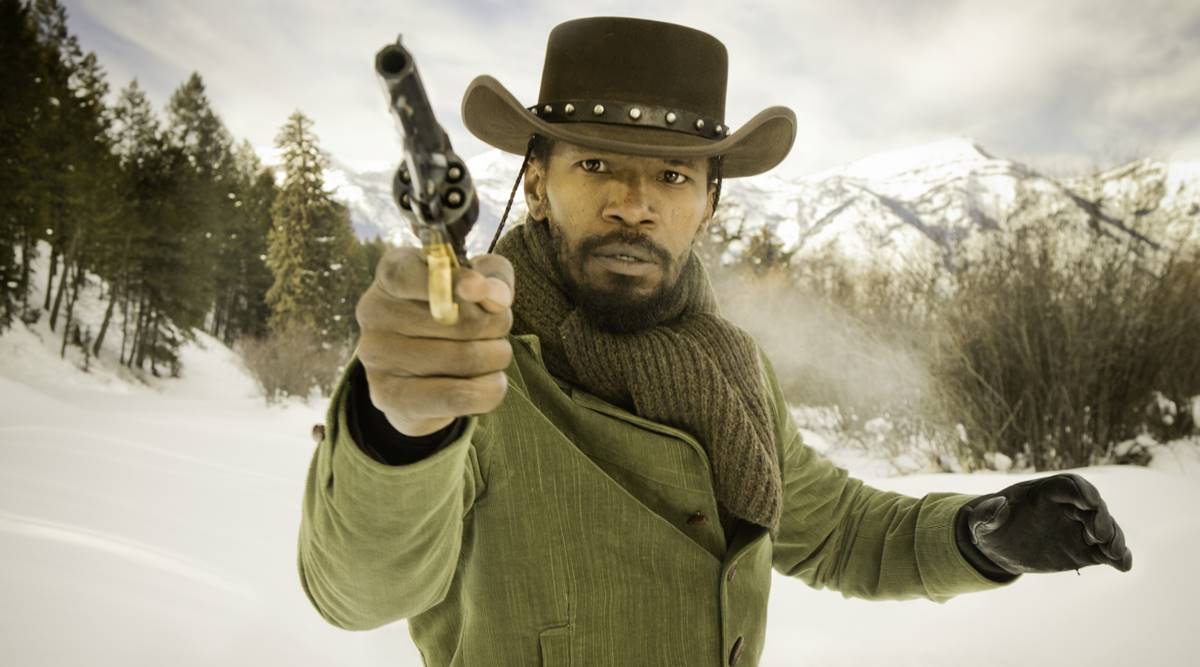 Jamie Foxx in Django Unchained. (Photo: Sony Pictures Releasing)
Jamie Foxx in Django Unchained. (Photo: Sony Pictures Releasing) Quentin Tarantino is as beloved as he is controversial. Fame attracts controversies, yes. But in Tarantino’s case, his craft brings in the heat, so to speak. There has hardly been any movie that Tarantino has made that has not faced some form of backlash. The decade-old release Django Unchained is no exception. It was nominated for five Oscars, including Best Picture. Christoph Waltz won the Academy Award in the Best Supporting Actor category, and yet, the Jamie Foxx-starrer had to battle criticism in interviews, some reviews and the internet in general. This is not to suggest that Tarantino is some kind of niche filmmaker, an underdog who could do without all the dragging. The director can take the questions, but, in his defence, he has been taking a version of the same question for years now. Every time a movie releases, a section of the audience wonders, why was there the need to show this much violence, why use the loaded ‘N’ term at all?
However, in Django Unchained’s case, Tarantino had a proper explanation: “I show what I see, what I read had happened, what the history said took place. That African American people were called that word to demean them, to show them their place, to belittle them until they lost the sense of being a human at all.” So Tarantino is not being a historian in Django Unchained, but he is also not distorting facts. The man is merely using his talents to embellish a certain ugliness that already existed in humanity. He is being a mirror in a sense. And mirrors are hard to look at, especially for people who believe themselves to be too self-righteous. The multitude of reactions Django Unchained evoked, showed us the impact a film like that can have. Making and being a part of a project on race is always an act of courage, it shows that the artistes are willing to take the appreciation and the volleying, go through the whole gamut just to create something they believe in.
Django Unchained is that movie, for me at least. It is bold, it is stylish as hell and it packs a punch without missing a beat. The movie never feels long, despite its 165 minutes runtime. It puts a black person in the center as the hero of his own story. It gives him power to question and to show what he knows, the only hiccup being the director-writer was a white man. But Quentin had consultants, he was surrounded by black artistes to give him perspective if he went wrong. And if so many people of that race stand by that movie after having given their sweat to it, this can only translate into one thing — Tarantino knew what he was doing. One has to presume that he must have been sensitive in dealing with his actors while doling out tough sequences to perform. Samuel L Jackson and Jamie Foxx have time and again come to his defence for the violence and cruelty he showed in Django Unchained.
For the uninitiated, Django Unchained revolves around a free slave by the name of Django (a spectacular Foxx) who joins team with a bounty hunter (Christoph Waltz) to rescue his wife (Kerry Washington) from the clutches of a despicable plantation owner Calvin (Leonardo DiCaprio). Whether he succeeds or not matters here (and he does, hurray!). But his journey to gather courage and make all the way to Calvin’s den without being killed first is a feat in itself, and Tarantino tells that story in the way only he can — with real relish for good, honest to boot stories. While all of the cast was splendid, as far as I am concerned, Leonardo DiCaprio was the definite scene stealer.
The portrayal was an enigmatic mix of charisma and unnerving variety of inhumanity. You detested Calvin, but could get an understanding of why he was so feared. Leonardo as Calvin had a commanding presence on screen which took on a life of its own, especially when watched in a theatre. To play someone from whom you are personally removed is the basic job description of an actor, but in essaying the role of one of the most racist man you have ever come across has to come with a baggage. In an earlier interview, lead star Foxx had opened up about the kind of reservations Leonardo had the first day on set, until Samuel Jackson finally told him that it’s just ‘another Tuesday.’ The next day, Leonardo was the devil incarnate as Calvin Candie. And the rest, as they say, is history (pun intended).
You can watch Django Unchained on Netflix, SonyLIV, Apple TV Plus, YouTube and Google Play.
- The Indian Express website has been rated GREEN for its credibility and trustworthiness by Newsguard, a global service that rates news sources for their journalistic standards.

